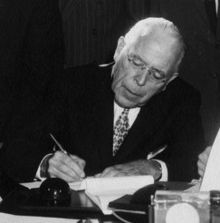David Leo Lawrence
David Leo Lawrence (born June 18, 1889 in Pittsburgh , Pennsylvania , † November 21, 1966 ) was an American politician and the 39th governor of the state of Pennsylvania from 1959 to 1963 .
Early years
David Lawrence was of Irish descent. He attended a business school for two years. At the age of 14 he got a job as clerk with the Pittsburgh attorney William Brennan, who was also the local chairman of the Democratic Party . Brennan became the young Lawrence's mentor. At the Democratic National Convention in 1912, Lawrence supported Woodrow Wilson's nomination for president. During World War I he served in the legal department of the US Army in Washington, DC .
Political rise
Upon his return to civilian life, Lawrence became Democratic Party leader in Allegheny County . At the time, this area was a stronghold of the Republican Party . Lawrence managed to break this supremacy. Through these successes he gained prestige and influence in the party, which steadily increased in the course of the 1920s. In 1933, President Franklin D. Roosevelt named him head of federal finance in western Pennsylvania. He held this office until 1934. That year, Lawrence supported the campaign of George Howard Earle , who was preparing to be elected as the first Democratic governor of Pennsylvania in the 20th century. After his successful election, Earle reciprocated and appointed Lawrence Secretary of the Commonwealth of Pennsylvania. He held this office between 1935 and 1939. In 1934, Lawrence was chairman of his party in Pennsylvania. Between 1946 and 1959 he served as mayor of Pittsburgh . In 1958 he was himself elected the new governor of his state, with 50.8 percent of the vote just barely prevailing against the Republican Arthur T. McGonigle (48.9 percent).
Governor of Pennsylvania
David Lawrence began his four-year term on January 20, 1959. In essence, he continued the policies of his predecessor, George Michael Leader . He took over most of the cabinet members in his government. Lawrence campaigned against discrimination, promoted environmental protection and expanded the country's state libraries. It was also around the time that road safety laws were passed in Pennsylvania. On the other hand, he has increased the administrative bureaucracy. The resulting additional costs were offset by an increase in VAT. In 1962, a constitutional clause prevented Lawrence from standing directly for re-election. Therefore, he resigned on January 15, 1963 from his office.
Federal political influence and further curriculum vitae
From 1912 he was at all federal party conventions of the Democrats until his death. He was instrumental in the 1932 nomination of Franklin Roosevelt as a presidential candidate. In 1960 he supported John F. Kennedy . He advised Kennedy at the time to nominate Lyndon B. Johnson as his runner-up candidate. After the end of his governorship, Lawrence devoted himself to his private interests. However, he continued to observe the political development of his state. On November 4, 1966, he collapsed while supporting Milton Shapp's gubernatorial campaign. 17 days later, on November 21, Lawrence passed away without regaining consciousness. He was married to Alice Golden, with whom he had five children.
Web links
- David L. Lawrence in the database of the National Governors Association (English)
- The governors of Pennsylvania (English)
- David L. Lawrence in the database of Find a Grave (English)
- David L. Lawrence in nndb (English)
| personal data | |
|---|---|
| SURNAME | Lawrence, David Leo |
| BRIEF DESCRIPTION | American politician |
| DATE OF BIRTH | June 18, 1889 |
| PLACE OF BIRTH | Pittsburgh , Pennsylvania |
| DATE OF DEATH | November 21, 1966 |
| Place of death | Pittsburgh , Pennsylvania |

